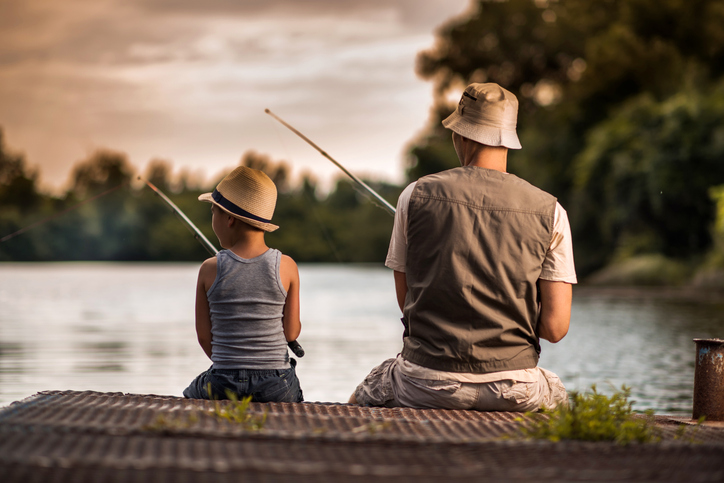Fishing with my kids has become one of our favorite ways to spend time together. It’s not just about the thrill of catching a fish (though that’s always exciting) but teaching them life lessons, like patience and persistence, while having fun in nature. Over the years, I’ve learned a few things about keeping kids engaged and entertained during a fishing trip, and I’d love to share my insights with other parents looking to enjoy this timeless activity.
Here’s my guide to teaching patience and having fun while fishing with your kids:
Preparing for the Trip
Before you even hit the water, the success of your fishing trip depends on good preparation. Kids need fun and structure, and a bit of planning goes a long way.
- Pick the Right Spot: Choose a kid-friendly location. Look for a spot with calm waters and easy access, like a local pond or a dock at a lake. Bonus points if there’s a playground or picnic area nearby in case the kids lose interest in fishing.
- Pack the Essentials: Beyond the fishing gear, bring snacks, drinks, sunscreen, bug spray, and hats. Trust me, a hungry or sunburned kid will not enjoy fishing! I also like to bring a small first-aid kit because you never know when someone might get a scrape or prick a finger on a hook.
- Choose the Right Gear: Don’t overcomplicate things with advanced equipment. A simple, lightweight fishing rod designed for kids works great. You can find colorful, fun designs with easy-to-use reels. The goal is to make it approachable for them.
- Explain What to Expect: Kids often get excited but don’t always understand that fishing takes time. Before heading out, I explain that we might not catch anything right away—or at all—and that the fun comes from spending time together and enjoying being outside.
Making It Fun While On the Water
Fishing requires patience, but that doesn’t mean the experience has to be boring. I’ve found some clever ways to keep my kids entertained and involved.
- Turn Fishing into a Game: Kids love a sense of competition. I like to create small challenges, like who can cast the farthest, who can catch the first fish, or even who finds the most interesting rock by the shoreline. It keeps them focused and excited.
- Teach Them the Basics: Kids are naturally curious, so use this opportunity to explain how fishing works. Show them how to cast, reel, and handle the line. I break it down into small, manageable steps and let them try it themselves. They’ll feel proud when they master a new skill.
- Celebrate the Little Wins: Maybe they didn’t catch a fish this time, but did they learn to cast better? Did they spot a frog by the water? Celebrate even the smallest moments—it keeps the experience positive and fun.
- Bring Stories and Trivia: When the fish aren’t biting, I like to share fun stories about fishing or throw in some trivia about the local wildlife. “Did you know fish have a special line on their body that helps them sense movement in the water?” Stuff like that fascinates kids.
- Switch It Up: If fishing starts to feel slow, take breaks to explore around the area. We’ll skip rocks, look for coolinsects, or even have a little snack break. By switching activities, you’re keeping the trip dynamic and fun.
Teaching Patience in a Fun Way
For kids, patience doesn’t always come naturally. Fishing is the perfect opportunity to teach this skill without them even realizing it.
- Use Nature as a Teacher: I point out how fish don’t rush and how they glide through the water, waiting for the right moment. It’s a subtle way to show kids how patience pays off.
- Show, Don’t Tell: I’ve learned that lecturing kids about patience doesn’t work all the time. Instead, I model it. If I’m sitting calmly, waiting for a bite, it teaches them to mirror that behavior. Kids pick up more from what we do than what we say.
- Make Waiting an Adventure: While waiting for a fish to bite, we turn it into a game. We play “I Spy,” count the ripples on the water, or guess how long it will take to catch something. The key is keeping their minds engaged.
- Reward Their Patience: When they manage to wait without fussing, I make sure to acknowledge it. “Wow, you were so patient just now! Great job!” Positive reinforcement goes a long way in encouraging the behavior.
Life Lessons Along the Way
Fishing isn’t just about catching fish. It’s a chance to teach valuable life lessons in a real-world setting.
- Persistence Pays Off: Sometimes we’ll wait for what feels like forever, only for a fish to finally take the bait. It’s a great way to show kids that sticking with something can lead to success.
- Dealing with Disappointment: Not every trip ends with a big catch, and that’s okay! I remind my kids that it’s about the experience, not the outcome. It’s a valuable lesson that things don’t always go the way we want, and that’s part of life.
- Respect for Nature: I use fishing trips to teach my kids about the importance of taking care of the environment. We always clean up after ourselves, practice catch-and-release when needed, and talk about why it’s important to respect wildlife.
- Teamwork and Sharing: If one of my kids catches a fish, I encourage them to share the moment with their sibling by letting them help reel it in. It’s a great way to build teamwork and bond as a family.
Handling Challenges
Fishing with kids isn’t always smooth sailing, but with a little patience on your part, you can navigate the hiccups.
- When They Get Frustrated: Sometimes, the line gets tangled, or the fish just aren’t biting. I remind my kids that it’s normal to feel frustrated, but we can solve problems together. If they need a break, I let them take one.
- Dealing with Short Attention Spans: If your child loses interest quickly, don’t push them to keep fishing. Instead, let them explore or try something else. Forcing them won’t create good memories.
- Safety First: Hooks and sharp tools can be dangerous, so I always keep a close eye on the kids and teach them proper handling techniques. Safety is non-negotiable.
Wrapping Up the Day
How you end the fishing trip can leave a lasting impression, so I always make sure to end on a positive note.
- Celebrate Together: Whether we caught fish or not, we celebrate the effort. I tell my kids how proud I am of their patience and teamwork and ask them what their favorite part of the trip was.
- Reflect on the Experience: On the drive home, we talk about what we learned. It’s a great way to reinforce the lessons of the day and make the outing feel meaningful.
- Plan the Next Adventure: If the kids had fun, we start brainstorming where we’ll go next. Keeping them excited about future fishing trips builds anticipation and keeps the activity alive in their minds.
Final Thoughts
Fishing with my kids has become more than just a pastime—it’s a tradition. It’s where we laugh, learn, and connect in ways that are hard to replicate elsewhere. Teaching them patience through fishing has been one of the most rewarding parts of parenting for me. It’s not just about catching fish; it’s about creating memories, sharing life lessons, and spending quality time together.
So, if you’re thinking about taking your kids fishing, do it! Embrace the chaos, the quiet moments, and the joy of being out in nature. It’s worth every tangle, splash, and missed catch.

